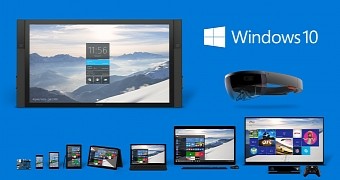Microsoft’s pushing everyone to Windows 10, and while the company’s plans are going as expected (or at least that’s what the software giant’s executives claim), Windows revenue is likely to go down this year.
A report by the WSJ and citing a forecast made by Gartner indicates that Windows revenue is expected to decline 7.5 percent to $13.5 billion (€11.9 billion). This is mainly because those who are upgrading to the new operating system are mostly consumers, and they do it free of charge under the 12-month upgrade promo launched in July 2015.
While these estimates are not exactly good news for Microsoft, the company kind of expected this to happen when it decided to offer the operating system free of charge to Windows 7 and 8.1 customers.
Why revenue is expected to drop
There are three reasons Windows revenue is expected to decline this year (it’s important to note that a recovery is very likely next year, though).
First of all, it’s because of collapsing PC sales. Shipments of new computers have fallen dramatically in the last quarters, and new data shows that declines could be experienced in the remainder of the year too. Microsoft’s Windows 10 sales are based on shipments of PCs, so without the desktop market going strong, it’s nearly impossible for Redmond to improve Windows sales.
Then, it’s the free upgrade promo that Microsoft is offering since July 2015. Customers can upgrade their Windows 7 and 8.1 computers to Windows 10 without paying, so there’s no reason to purchase a new license just for this new operating system.
And last but not least, enterprises are yet to upgrade to Windows 10, and most of them are still conducting pilot programs to determine if the transition is necessary or not. That’s why a growth is expected to take place in 2017, as most are projected to complete piloting Windows 10 by the end of the year and then begin the upgrade process.
Many enterprises are waiting for the Redstone update coming this year before actually moving to Windows 10, as they still think that the OS isn’t ready, and this release could help it reach maturity.

 14 DAY TRIAL //
14 DAY TRIAL //